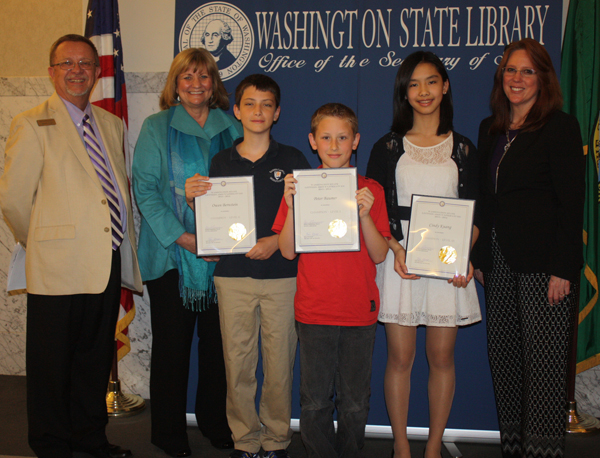Showing the power of books to think, inspire
From left: State Librarian Rand Simmons, first lady Trudi Inslee, Level 2 champion Owen Bernstein, Level 1 champion Peter Baumer, Level 3 champion Cindy Kuang and Secretary Wyman.
One focused on the challenges of living on a farm in the past, including the lack of computers and other electronics. Another dealt with summoning the courage to take a stand for what is right, even when it’s unpopular with others. The third compared a brother’s accident with that of a character in a book.
These were some of the life lessons from the three state champions in this year’s Letters About Literature contest.
The annual competition, sponsored by the Washington State Library and the Library of Congress, encourages students in grades 4-12 to write letters to their favorite authors, past or present. More than 4,000 took part.
Secretary of State Kim Wyman and first lady Trudi Inslee recognized the three state champions, three second-place runners-up and 26 honorable mention winners during an awards ceremony in the Legislative Building’s Columbia Room Friday. State Librarian Rand Simmons emceed the gathering.
“I thoroughly enjoy recognizing all of these students, and their parents, for doing so well in this great contest,” Wyman said. “Letters About Literature is special because it encourages students to not only read, but to put their thoughts about a favorite book onto paper. These letters are so thoughtful and moving. Congratulations to the students honored here at the Capitol, as well as all who competed.”
TVW covered the ceremony, and plans to air it Tuesday at 7:30 p.m., Thursday at 8 p.m. and May 18 at 9 p.m. Go to TVW’s website to view the ceremony.
Peter Baumer, a fourth-grader from Port Orchard, is the Level 1 (grades 4-6) state champion. Baumer wrote his letter to Laura Ingalls Wilder about her book Farmer Boy.
From Peter’s letter:
“I know Farmer Boy influenced me because it encouraged me to try to do things without electronics. Every time I want to know something I go to my computer and Google what I want to know. Almanzo and his family couldn’t do that. They had to use information they learned over time by using their brains and their hands, not computers. They had to keep trying different things until they found something that worked.”
Owen Bernstein, a seventh-grader at Eastside Catholic Middle School in Sammamish, is the Level 2 (grades 7-8) champ. Bernstein’s letter is to Orson Scott Card about his book Pastwatch.
Part of Owen’s letter talks about how Pastwatch inspired him to join protests against the dismissal of an administrator at Eastside Catholic High School because of his marriage to another man:
“At one rally, I stood in the cold for over an hour and by the end my throat was sore and arm ached but when I got home and lay down I felt satisfied. I felt that maybe this small action could change the world. I knew that it had changed me. It felt good to take a stand for what I believe. I wondered if Christopher, Tagiri, Diko, Kemal or Hunahpu felt that way. If, even as they gave up everything, they felt like they had become stronger as they tried to help others. I knew that I felt that way. Pastwatch showed me that to be the person I want to be, I must face my fears and voice my beliefs – even if they are different from the beliefs of people around me.”
Cindy Kuang, a 10th-grader from Woodinville who attends Inglemoor High School in Kenmore, is the Level 3 champion (grades 9-10). Kuang penned her letter to Jerry Spinelli about his book Smiles to Go.
Cindy wrote about how an accident involving one of the book’s characters made her recall when her younger brother was hit and injured by a car years ago.
“When Tabby is hospitalized in Smiles after trying to go down Dead Man’s Hill, the scene of my brother’s accident was called forth in my head. I understood Will’s shock in seeing Tabby’s condition, because I had felt the same way in the wake of the collision. And, when Will first responded not with a newfound willingness to love, but with bitterness, I understood that, too.”
More than 125 schools from around the state submitted entries. The contest ran from September to January.
Contestants wrote a personal letter to an author, explaining how his or her work influenced their perspective on the world or themselves. Students can write about works of fiction, nonfiction, or poetry. They cannot write about music lyrics, comic books or comic strips. National winners receive a $1,000 cash award.
This is the ninth year that the Washington State Library and the Office of Secretary of State have sponsored the competition as part of Washington Reads, which highlights books about Washington or the Pacific Northwest. The project is also sponsored by The Center for the Book in the Library of Congress.
The Washington State Library is a division of the Office of Secretary of State.
